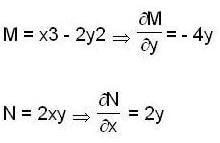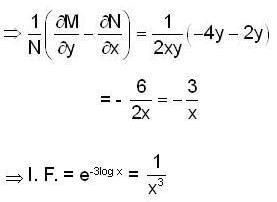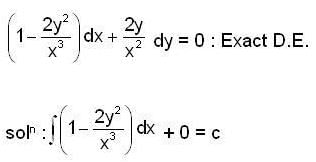Mathematics Exam > Mathematics Questions > Let y(x) be the solution of the differential ...
Start Learning for Free
Let y(x) be the solution of the differential equation (x3 - 2y2) dx + 2xy dy = 0 Satisfying y(1) = 1, then which of the following is true ?
- a)y(x) exist in the neighbourhood of 2.
- b)y(x) exist in the neighbourhood of 0.
- c)y(x) exist for all x ∈ R
- d)y(x) exist for all x s.t. |x| > 2
Correct answer is option 'B'. Can you explain this answer?
| FREE This question is part of | Download PDF Attempt this Test |
Verified Answer
Let y(x) be the solution of the differential equation (x3 - 2y2) dx + ...
we lave (x3 - 2y2) dx + 2xy dy = 0 ....(1) compare it with M dx + N dy = 0, we have


Mult, given eqn (1) by its I.F. we have


given y(1) = 1 ⇒c = 2
⇒ x3 + y2 = 2x2
⇒y3 = 2x2 = x3 = x3 (2 - x)
⇒ y(x) exist for all x < - 2.
⇒y(x) exist in the neighbourhood of 0.
Most Upvoted Answer
Let y(x) be the solution of the differential equation (x3 - 2y2) dx + ...
To solve the differential equation, we can rearrange it as follows:
(x^3 - 2y^2)dx + 2xydy = 0
Dividing by x, we get:
(x^2 - 2y^2/x)dx + 2ydy = 0
Now, let's check the exactness of the equation by verifying if it satisfies the condition:
∂(M)/∂(y) = ∂(N)/∂(x)
where M = (x^2 - 2y^2/x) and N = 2y.
∂(M)/∂(y) = -4y/x
∂(N)/∂(x) = 0
Since ∂(M)/∂(y) ≠ ∂(N)/∂(x), the equation is not exact.
To make it exact, we can multiply through by x:
x(x^2 - 2y^2/x)dx + 2xydy = 0
x^3dx - 2y^2dx + 2xydy = 0
Now, let's check the exactness of this equation:
∂(M)/∂(y) = -4y
∂(N)/∂(x) = 0
Since ∂(M)/∂(y) = ∂(N)/∂(x), the equation is exact.
Now, we need to find the integrating factor to solve the equation. The integrating factor (IF) can be found using the formula:
IF = e^(∫(∂(M)/∂(y) - ∂(N)/∂(x))/N) dx
IF = e^(∫(-4y/2xy) dx)
IF = e^(-∫(2y/2xy) dx)
IF = e^(-∫(1/x) dx)
IF = e^(-ln|x|)
IF = 1/x
Multiplying the entire equation by the integrating factor, we have:
x^2dx - 2y^2dx + 2xydy = 0
Dividing by x, we get:
xdx - 2y^2dx/x + 2ydy = 0
Integrating both sides, we have:
(1/2)x^2 - 2y^2ln|x| + y^2 = C
Using the initial condition y(1) = 1, we can substitute the values and solve for C:
(1/2)(1)^2 - 2(1)^2ln|1| + (1)^2 = C
1/2 - 2ln(1) + 1 = C
1/2 - 2(0) + 1 = C
1/2 + 1 = C
C = 3/2
Therefore, the solution to the differential equation with the initial condition y(1) = 1 is:
(1/2)x^2 - 2y^2ln|x| + y^2 = 3/2
Now, let's analyze the given options:
a) y(x) exists in the neighborhood of 2.
We cannot determine if y(x) exists in the neighborhood of 2 based on the information given.
(x^3 - 2y^2)dx + 2xydy = 0
Dividing by x, we get:
(x^2 - 2y^2/x)dx + 2ydy = 0
Now, let's check the exactness of the equation by verifying if it satisfies the condition:
∂(M)/∂(y) = ∂(N)/∂(x)
where M = (x^2 - 2y^2/x) and N = 2y.
∂(M)/∂(y) = -4y/x
∂(N)/∂(x) = 0
Since ∂(M)/∂(y) ≠ ∂(N)/∂(x), the equation is not exact.
To make it exact, we can multiply through by x:
x(x^2 - 2y^2/x)dx + 2xydy = 0
x^3dx - 2y^2dx + 2xydy = 0
Now, let's check the exactness of this equation:
∂(M)/∂(y) = -4y
∂(N)/∂(x) = 0
Since ∂(M)/∂(y) = ∂(N)/∂(x), the equation is exact.
Now, we need to find the integrating factor to solve the equation. The integrating factor (IF) can be found using the formula:
IF = e^(∫(∂(M)/∂(y) - ∂(N)/∂(x))/N) dx
IF = e^(∫(-4y/2xy) dx)
IF = e^(-∫(2y/2xy) dx)
IF = e^(-∫(1/x) dx)
IF = e^(-ln|x|)
IF = 1/x
Multiplying the entire equation by the integrating factor, we have:
x^2dx - 2y^2dx + 2xydy = 0
Dividing by x, we get:
xdx - 2y^2dx/x + 2ydy = 0
Integrating both sides, we have:
(1/2)x^2 - 2y^2ln|x| + y^2 = C
Using the initial condition y(1) = 1, we can substitute the values and solve for C:
(1/2)(1)^2 - 2(1)^2ln|1| + (1)^2 = C
1/2 - 2ln(1) + 1 = C
1/2 - 2(0) + 1 = C
1/2 + 1 = C
C = 3/2
Therefore, the solution to the differential equation with the initial condition y(1) = 1 is:
(1/2)x^2 - 2y^2ln|x| + y^2 = 3/2
Now, let's analyze the given options:
a) y(x) exists in the neighborhood of 2.
We cannot determine if y(x) exists in the neighborhood of 2 based on the information given.

|
Explore Courses for Mathematics exam
|

|
Similar Mathematics Doubts
Let y(x) be the solution of the differential equation (x3 - 2y2) dx + 2xy dy = 0 Satisfying y(1) = 1, then which of the following is true ?a)y(x) exist in the neighbourhood of 2.b)y(x) exist in the neighbourhood of 0.c)y(x) exist for all x ∈Rd)y(x) exist for all x s.t. |x| > 2Correct answer is option 'B'. Can you explain this answer?
Question Description
Let y(x) be the solution of the differential equation (x3 - 2y2) dx + 2xy dy = 0 Satisfying y(1) = 1, then which of the following is true ?a)y(x) exist in the neighbourhood of 2.b)y(x) exist in the neighbourhood of 0.c)y(x) exist for all x ∈Rd)y(x) exist for all x s.t. |x| > 2Correct answer is option 'B'. Can you explain this answer? for Mathematics 2024 is part of Mathematics preparation. The Question and answers have been prepared according to the Mathematics exam syllabus. Information about Let y(x) be the solution of the differential equation (x3 - 2y2) dx + 2xy dy = 0 Satisfying y(1) = 1, then which of the following is true ?a)y(x) exist in the neighbourhood of 2.b)y(x) exist in the neighbourhood of 0.c)y(x) exist for all x ∈Rd)y(x) exist for all x s.t. |x| > 2Correct answer is option 'B'. Can you explain this answer? covers all topics & solutions for Mathematics 2024 Exam. Find important definitions, questions, meanings, examples, exercises and tests below for Let y(x) be the solution of the differential equation (x3 - 2y2) dx + 2xy dy = 0 Satisfying y(1) = 1, then which of the following is true ?a)y(x) exist in the neighbourhood of 2.b)y(x) exist in the neighbourhood of 0.c)y(x) exist for all x ∈Rd)y(x) exist for all x s.t. |x| > 2Correct answer is option 'B'. Can you explain this answer?.
Let y(x) be the solution of the differential equation (x3 - 2y2) dx + 2xy dy = 0 Satisfying y(1) = 1, then which of the following is true ?a)y(x) exist in the neighbourhood of 2.b)y(x) exist in the neighbourhood of 0.c)y(x) exist for all x ∈Rd)y(x) exist for all x s.t. |x| > 2Correct answer is option 'B'. Can you explain this answer? for Mathematics 2024 is part of Mathematics preparation. The Question and answers have been prepared according to the Mathematics exam syllabus. Information about Let y(x) be the solution of the differential equation (x3 - 2y2) dx + 2xy dy = 0 Satisfying y(1) = 1, then which of the following is true ?a)y(x) exist in the neighbourhood of 2.b)y(x) exist in the neighbourhood of 0.c)y(x) exist for all x ∈Rd)y(x) exist for all x s.t. |x| > 2Correct answer is option 'B'. Can you explain this answer? covers all topics & solutions for Mathematics 2024 Exam. Find important definitions, questions, meanings, examples, exercises and tests below for Let y(x) be the solution of the differential equation (x3 - 2y2) dx + 2xy dy = 0 Satisfying y(1) = 1, then which of the following is true ?a)y(x) exist in the neighbourhood of 2.b)y(x) exist in the neighbourhood of 0.c)y(x) exist for all x ∈Rd)y(x) exist for all x s.t. |x| > 2Correct answer is option 'B'. Can you explain this answer?.
Solutions for Let y(x) be the solution of the differential equation (x3 - 2y2) dx + 2xy dy = 0 Satisfying y(1) = 1, then which of the following is true ?a)y(x) exist in the neighbourhood of 2.b)y(x) exist in the neighbourhood of 0.c)y(x) exist for all x ∈Rd)y(x) exist for all x s.t. |x| > 2Correct answer is option 'B'. Can you explain this answer? in English & in Hindi are available as part of our courses for Mathematics.
Download more important topics, notes, lectures and mock test series for Mathematics Exam by signing up for free.
Here you can find the meaning of Let y(x) be the solution of the differential equation (x3 - 2y2) dx + 2xy dy = 0 Satisfying y(1) = 1, then which of the following is true ?a)y(x) exist in the neighbourhood of 2.b)y(x) exist in the neighbourhood of 0.c)y(x) exist for all x ∈Rd)y(x) exist for all x s.t. |x| > 2Correct answer is option 'B'. Can you explain this answer? defined & explained in the simplest way possible. Besides giving the explanation of
Let y(x) be the solution of the differential equation (x3 - 2y2) dx + 2xy dy = 0 Satisfying y(1) = 1, then which of the following is true ?a)y(x) exist in the neighbourhood of 2.b)y(x) exist in the neighbourhood of 0.c)y(x) exist for all x ∈Rd)y(x) exist for all x s.t. |x| > 2Correct answer is option 'B'. Can you explain this answer?, a detailed solution for Let y(x) be the solution of the differential equation (x3 - 2y2) dx + 2xy dy = 0 Satisfying y(1) = 1, then which of the following is true ?a)y(x) exist in the neighbourhood of 2.b)y(x) exist in the neighbourhood of 0.c)y(x) exist for all x ∈Rd)y(x) exist for all x s.t. |x| > 2Correct answer is option 'B'. Can you explain this answer? has been provided alongside types of Let y(x) be the solution of the differential equation (x3 - 2y2) dx + 2xy dy = 0 Satisfying y(1) = 1, then which of the following is true ?a)y(x) exist in the neighbourhood of 2.b)y(x) exist in the neighbourhood of 0.c)y(x) exist for all x ∈Rd)y(x) exist for all x s.t. |x| > 2Correct answer is option 'B'. Can you explain this answer? theory, EduRev gives you an
ample number of questions to practice Let y(x) be the solution of the differential equation (x3 - 2y2) dx + 2xy dy = 0 Satisfying y(1) = 1, then which of the following is true ?a)y(x) exist in the neighbourhood of 2.b)y(x) exist in the neighbourhood of 0.c)y(x) exist for all x ∈Rd)y(x) exist for all x s.t. |x| > 2Correct answer is option 'B'. Can you explain this answer? tests, examples and also practice Mathematics tests.

|
Explore Courses for Mathematics exam
|

|
Suggested Free Tests
Signup for Free!
Signup to see your scores go up within 7 days! Learn & Practice with 1000+ FREE Notes, Videos & Tests.


















